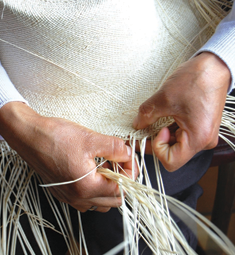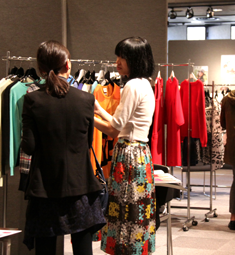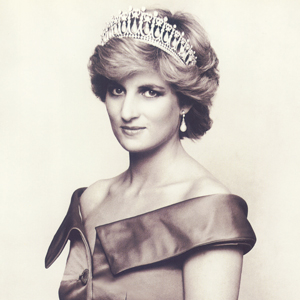Hats, cashmere, “upcycled” fabric draw record number of visitors to British fashion mission
• Japanese are big and prompt payers
• UK fashion sector dwarfs car industry
• Sustainability, heritage and quality sell
• Demand for innovative, unique brands
Japan has always been a fertile hunting ground for the UK’s fashion designers, but the two-day showcase event of this year’s Great Britain Fashion Mission to Japan attracted the highest-ever number of buyers and media visitors.
Staged at the Laforet Museum Harajuku, 24 British fashion firms displayed their products at the “meet-the-buyers” opportunity, with many already reporting positive results.
“We met with a number of buyers from large department stores, select shops, distributors and agents”, said Mark Rogers of specialist hat makers Pachacuti Ltd. The name means “world upside-down” in Quechua, an indigenous language of the Andean region.
“We can certainly see great potential for Pachacuti in the Japanese market, as there are so many stores stocking hats”, Rogers said.
“Many of the larger stores generally place small initial orders and then build up their business over the years, as they gain confidence in you as a reliable supplier. So we are hoping sales to current customers will gradually increase, and that we will supply new stores”.
Established in 1992 and based in Ashbourne, on the edge of the Peak District, Pachacuti is renowned for its collection of Panama hats. In 2009, it was the first firm in the world to be Fair Trade Certified by the World Fair Trade Organization, the global authority of fair trade.
With a staff of seven, Pachacuti supplies 300 retailers worldwide and has created private label collections for clothing brands such as Paul Smith, Monsoon and Cath Kidston.
The firm is now looking to expand in Japan, which already represents 60% of its export sales and where its hats are available at Matsuya Co., Ltd and Isetan Mitsukoshi department stores.
“Japan has been our biggest growth market and, unlike Europe, where hat-wearing has been in decline, hats are worn frequently here, both for fashion purposes and for sun protection”, said Rogers. “In Japan, a hat is perceived as ‘making an outfit’ and is an important fashion accessory, while in Europe and the US, hats are worn infrequently by the majority of the population.
“An additional reason for expanding sales in Japan during these difficult economic times is that the Japanese are very prompt in paying and, generally, pay 50% in advance, which really helps our cash flow”.
Scottish knitwear brand Caerlee 1788 Ltd, which has its own cashmere mill in Innerleithen, southern Scotland, has made an initial foray into Japan. The firm’s co-founder, Valerie Voon, has high hopes for the market here.
“We have been visited by many Japanese, both media and tourists, who discovered that we are the maker of Ballantyne hand-intarsia cashmere knitwear”, Voon said. “From their interest in our knitwear, we decided that, as a brand, we can offer products made by our cashmere artisans directly for the Japanese market”.
While the brand is new, the mill has been operating for about 220 years, making it Scotland’s oldest continually operating cashmere mill.
“I love the fashion in Japan and the fact that Japanese understand and appreciate beautiful, well-made products, as well as having a deep understanding of craftsmanship”, she said. “That is important to us, because that is what we are about.
“I believe we have great potential in this market and that there will be increasing interest in high-quality craftsmanship and luxury products”, she said.
The brand has deep roots in British heritage and, since Caerlee 1788 prefers using Scottish yarns, the garments are 100% made in Scotland. “I think this resonates well with the Japanese market”, she added.
Lost Property of London is another newcomer to the British fashion scene, specialising in incorporating second-hand fabrics into beautiful yet practical totes and travel bags. The studio was founded in 2009 by Katy Bell, a graduate of London-based Central Saint Martins College of Arts and Design, when she turned a fair trade coffee sack into a prototype bag.
Three years later, the firm’s items are stocked in boutiques and department stores from Dubai, the US and Italy, to Hong Kong and Japan.
“There were many companies which we were keen to meet again, having had a lot of interest from the Japanese market during the previous trade show in Paris”, Bell told BCCJ ACUMEN.
“Buyers seemed very receptive to our ethos, so I feel the Japanese fashion industry is open to the concept of sustainability”, she explained. “They care about detail, and don’t mind spending slightly more to ensure quality.
“We believe that our products will work well in the Japanese market, primarily because we have a product with a strong story”, she added. “All of our products are made in London using upcycled materials found within the city. This unique selling point has proved extremely popular in the Japanese market”.

The specialist hat makers were the first firm to be Fair Trade Certified by the World Fair Trade Organization.
Bell hopes to be able to maintain and nurture the relationships that were forged on the brand’s first visit to Tokyo, and added that the initial reaction to the trade mission has given her the strong belief that the firm can do very well here.
While many British fashion firms fall into the small and medium-sized enterprise category, their collective contribution to the national economy is nothing short of huge—representing twice as much as that of the UK’s car manufacturing industry, pointed out Kae Miyazawa, one of the organisers of the UK Trade and Investment event.
“After the US, Japan has always been the most important export destination for the UK fashion industry. We continue to see fresh opportunities for innovative and unique brands that are determined to succeed here”, Miyazawa said.
“Japanese consumers are particularly understanding and appreciative of the quality and originality of UK fashion”, she added.
“This year’s UK fashion trade mission once again demonstrated that Japan continues to be one of the most fashion-forward countries in Asia, representing a valuable and important partner for the best of British fashion”.







